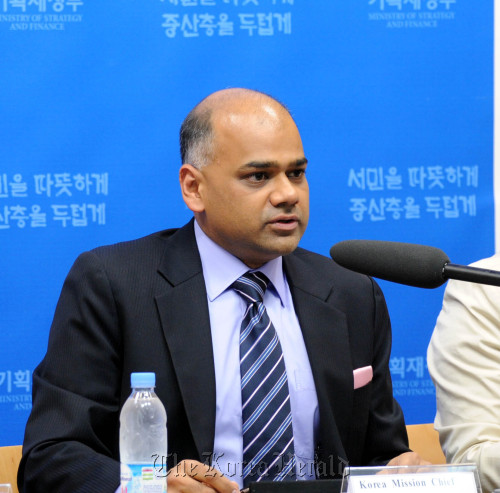[Herald Interview] IMF: Rate hikes should help tame stock volatilities
By 김주연Published : June 19, 2011 - 18:44
IMF, Finance Ministry split on focus of capital control measures
Korea should raise its policy rate faster to discourage volatile capital inflows into stocks and boost the effectiveness of capital barriers currently in place, Subir Lall, Internaional Monetary Fund's Mission Chief for Korea said.
The head of the IMF delegation here assessed Korea’s capital flow management “effective,” but said more can be done using monetary policy tools rather than control of foreign exchange rates.
Higher interest rates would “reduce some of the pull factors of the capital, especially for the equity market as it is so large,” Lall said in an interview with The Korea Herald after a press conference wrapping up its two-week annual meeting with policymakers here.
However, IMF’s push for faster normalization of rates as part of capital control differs from the view held at the Finance Ministry.
While the IMF calls for monetary tightening to restrain overall domestic demand of equities here, the Korean authorities see it as more imperative to tame surging foreign investment.
“Foreigners have been moving to the bond market and away from stocks and this could be more dangerous. Bond investors are more risk-averse and therefore are more speculative, flip fast on the slightest uncertainty especially in such times,” a Seoul official said.
Foreign investors’ portfolios have been moving toward government bonds and away from stocks.

They remained as net sellers of local stocks since April onwards. Foreigners net sold a total of 2.56 trillion won ($2.4 billion) in May and a total of 1.76 trillion won this month as of June 13. The bond market, in contrast, saw 17.32 trillion won of net inflow this month, according to the Korea Exchange. The trend reflects growing appetite for safe assets as investors are facing external uncertainties including the end of the second round of quantitative easing in the U.S. and the eurozone debt crisis.
The comments come as Seoul strengthened supervision of hot money inflows in the past year to prevent another liquidity freeze that hit the country at the height of the financial crisis in late 2008.
Korea, along with other emerging market economies such as Brazil and Turkey, has been placing barriers on surging foreign capital feared to hurt the domestic economy by raising value of the currency and exerting upward pressure on domestic inflation.
The Finance Ministry in June 2010 capped bank’s currency forward positions to help reduce volatility in the currency market. The measure was followed by a 14 percent tax on foreigner’s income from government bonds and a bank levy on short-term foreign currency loans.
The IMF, meanwhile, said higher rates will make the cost of borrowing more expensive and mitigate incentives for excessive risk taking in the stock market.
“Those capital flow management measures were helpful to avoid build up of capital but regarding the portfolio measures, we think some of them should go in hand with general macro policy stance of the country,” Burcu Aydin, a IMF economist in the delegation team added.
The comment is in line with IMF’s new framework that capital control measures should not discriminate against foreign capital and that it does not endorse a country’s capital control measures if the currency is undervalued. The Washington-based institution in April dropped its decade-long support of the free flow of capital and gave some support of capital control measures, saying emerging economies can, under some circumstances, put up barriers to protect their economies.
The two IMF experts on the Korean economy also underscored the need for a faster rate hike for inflation fight, saying the neutral policy rate for Korea stands at 4 percent, far above the current 3.25 percent rate. Inflation here exceeded the central bank’s target of 2 to 4 percent for a fifth straight month in May. The Bank of Korea raised its policy rate by 25 percentage points to 3.25 percent last week.
By Cynthia J. Kim (cynthiak@heraldcorp.com)






![[KH Explains] How should Korea adjust its trade defenses against Chinese EVs?](http://res.heraldm.com/phpwas/restmb_idxmake.php?idx=644&simg=/content/image/2024/04/15/20240415050562_0.jpg&u=20240415144419)











![[Today’s K-pop] Stray Kids to return soon: report](http://res.heraldm.com/phpwas/restmb_idxmake.php?idx=642&simg=/content/image/2024/04/16/20240416050713_0.jpg&u=)